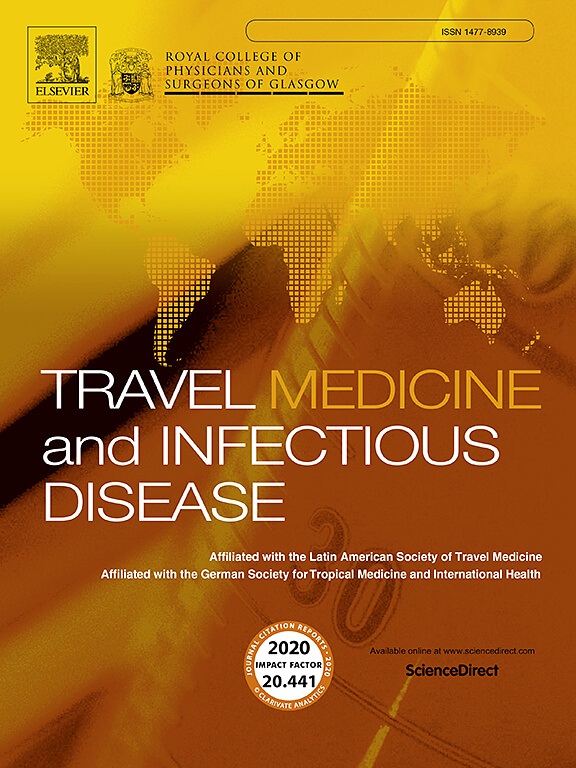Mpox knowledge, risk perception, attitudes and willingness to vaccinate in Colombia's LGBTIQ+ communities: Online survey (CoSex)
IF 4.7
3区 医学
Q1 INFECTIOUS DISEASES
引用次数: 0
Abstract
Background
In the 2022-23 global clade IIb mpox outbreak, Colombia was the sixth country with the most reported cases globally and the second in Latin America after Brazil. LGTBIQ + communities, especially those with extensive sexual networks, were particularly affected.
Objective
We aim to characterize the knowledge, risk perceptions, attitudes, and willingness to implement preventive measures against mpox among LGBTIQ + communities in Colombia.
Methods
This was an anonymized, cross-sectional, observational study based on a population-based online questionnaire using a participatory approach.
Results
Among the 784 participants from 66 municipalities, 49.1 % were aged 18–29 years, and 89.3 % were male and assigned at birth. A total of 73.9 % identified as homosexual, whereas 14.9 % reported never using condoms. Casual sexual partners were reported by 45.4 % of the participants in the past year (median: 3; range: 1–100), and 29.3 % engaged in group sex during the same period (median: 4; range: 2–100). Temporary behavioral changes to reduce mpox risk, such as limiting sexual partners and increasing condom use, were reported by 24.1 % of the participants. Suspected or confirmed mpox infection was reported by 4 % of the participants, with 77.4 % attributing potential exposure to sexual contact. Notably, 89.5 % expressed a willingness to receive mpox vaccination if it was offered.
Conclusions
Our findings demonstrate the importance of academic and social communities' cross-collaboration to understand the impact of mpox infection in this population and as a basis for planning epidemic responses to future mpox outbreaks in Colombia and Latin America.
哥伦比亚LGBTIQ+社区的Mpox知识、风险认知、态度和接种意愿:在线调查(CoSex)。
背景:在2022-23年全球ii支痘暴发中,哥伦比亚是全球报告病例最多的第6个国家,在拉丁美洲仅次于巴西。LGTBIQ+社区,尤其是那些拥有广泛性网络的社区,受到的影响尤其严重。目的:我们旨在描述哥伦比亚LGBTIQ+社区中实施预防措施的知识,风险认知,态度和意愿。方法:这是一项匿名、横断面、观察性研究,基于基于人群的在线问卷,采用参与式方法。结果:来自66个直辖市的784名参与者中,49.1%的人年龄在18-29岁之间,89.3%的人是出生时被分配的男性。共有73.9%的人被认为是同性恋,而14.9%的人从未使用过避孕套。45.4%的受访者在过去一年有过偶然性伴侣(中位数:3;范围:1-100),29.3%的人在同一时期有过群体性行为(中位数:4;范围:2 - 100)。24.1%的参与者报告了减少m痘风险的临时行为改变,如限制性伴侣和增加避孕套的使用。4%的参与者报告了疑似或确诊的m痘感染,77.4%归因于潜在的性接触。值得注意的是,89.5%的人表示愿意接受麻疹疫苗接种,如果提供的话。结论:我们的研究结果表明,学术界和社会团体的交叉合作对于了解这一人群中m痘感染的影响具有重要意义,并可作为规划未来哥伦比亚和拉丁美洲m痘疫情应对的基础。
本文章由计算机程序翻译,如有差异,请以英文原文为准。
求助全文
约1分钟内获得全文
求助全文
来源期刊

Travel Medicine and Infectious Disease
PUBLIC, ENVIRONMENTAL & OCCUPATIONAL HEALTH-INFECTIOUS DISEASES
CiteScore
19.40
自引率
1.70%
发文量
211
审稿时长
49 days
期刊介绍:
Travel Medicine and Infectious Disease
Publication Scope:
Publishes original papers, reviews, and consensus papers
Primary theme: infectious disease in the context of travel medicine
Focus Areas:
Epidemiology and surveillance of travel-related illness
Prevention and treatment of travel-associated infections
Malaria prevention and treatment
Travellers' diarrhoea
Infections associated with mass gatherings
Migration-related infections
Vaccines and vaccine-preventable disease
Global policy/regulations for disease prevention and control
Practical clinical issues for travel and tropical medicine practitioners
Coverage:
Addresses areas of controversy and debate in travel medicine
Aims to inform guidelines and policy pertinent to travel medicine and the prevention of infectious disease
Publication Features:
Offers a fast peer-review process
Provides early online publication of accepted manuscripts
Aims to publish cutting-edge papers
 求助内容:
求助内容: 应助结果提醒方式:
应助结果提醒方式:


